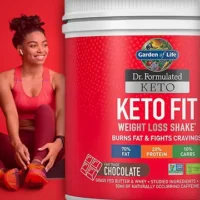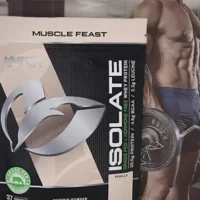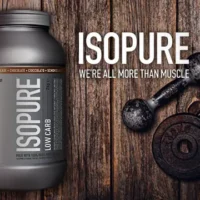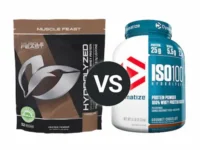Knowledge BaseYou're Questions Answered
BACK
Is whey protein keto friendly?
Whey protein can be a suitable addition to a ketogenic diet, depending on the specific product and how it fits into your daily macronutrient goals. The ketogenic diet emphasizes high fat, moderate protein, and very low carbohydrate intake.
Keto-Friendliness of Whey Protein
- Carbohydrate Content: To maintain ketosis, it's crucial to limit carbs. Some whey protein powders, especially those that are isolates, are very low in carbohydrates, typically containing less than 1 gram per serving, making them an excellent choice for keto dieters1.
- Fat Content: While whey protein does not naturally contain much fat, some keto-specific protein powders might include added fats from sources like MCTs (medium-chain triglycerides) to align more closely with keto macronutrient ratios2.
- Protein Levels: Moderate protein consumption is vital on a keto diet to prevent muscle loss without knocking you out of ketosis. Whey protein is effective because it provides high-quality protein that can help meet these needs without exceeding them3.
Choosing the Right Whey Protein for Keto
- Check the Label: Look for whey protein isolates rather than concentrates as they typically contain fewer carbohydrates.
- Avoid Added Sugars: Ensure the whey protein powder does not contain added sugars or high-carb fillers, which can disrupt ketosis.
- Consider Your Daily Macros: Incorporate whey protein into your overall daily macronutrient goals. It's important to balance your intake of fats, proteins, and carbs to stay within ketogenic guidelines.
Overall, whey protein can be part of a ketogenic diet when chosen carefully and consumed as part of a well-planned keto eating strategy. As always, monitor your body's response and adjust your diet accordingly to maintain ketosis and achieve your dietary goals.
Was this answer helpful? Let us know!
Like
References:
- Volek, J. S., & Phinney, S. D. (2012). The Art and Science of Low Carbohydrate Performance. Atria Books. Information on how dietary proteins influence ketosis and athletic performance.
- Stubbs, B. J., & Cox, P. J. (2015). Metabolic effects of exogenous ketone supplementation – An alternative or adjuvant to the ketogenic diet as a cancer therapy? Journal of Nutrition & Metabolism, 12, 35.
- Paoli, A., Rubini, A., Volek, J. S., & Grimaldi, K. A. (2013). Beyond weight loss: a review of the therapeutic uses of very-low-carbohydrate (ketogenic) diets. European Journal of Clinical Nutrition, 67(8), 789.
Add to this Answer
Related Questions

Disclosure
Your Answer
Do you have a suggestion to improve the answer? Please detail your suggestions and provide any references to information that may support your answer if available.
The content on this site has not been written, reviewed or endorsed by a medical professional. We assume no liability for the misuse of supplements and recommend you review the label of any product, as well as consulting with your health care professional.
We are a participant in the Amazon Services LLC Associates Program, an affiliate advertising program designed to provide a means for us to earn fees by linking to Amazon.com and affiliated sites.
We are a participant in the Amazon Services LLC Associates Program, an affiliate advertising program designed to provide a means for us to earn fees by linking to Amazon.com and affiliated sites.
© 2026 ProteinPowder.com






